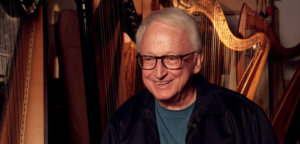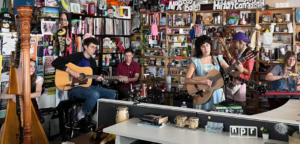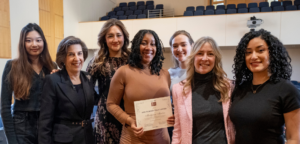At the age of 25, Anaëlle Tourret was named principal harpist with the NDR Elbphilharmonie Orchestra in Hamburg, Germany. A little over a year later, she successfully completed her one–year trial, so we thought it would be a good time to ask her about her experiences of becoming an official member of the orchestra.
Congratulations on winning the solo harp position with the NDR Elbphilharmonie Orchestra! How did you prepare for an audition of that level?
Thank you very much. After winning the second prize of the International Harp Contest in Israel in 2015, I knew I wanted to become a solo harpist in one of Europe’s major orchestra. It took me a long time of preparation, but I had the chance to have the support of my teachers, Ghislaine Petit–Volta, Nicolas Tulliez, Xavier de Maistre, and Catherine Michel, as well as my mentor Andreas Mildner, solo harp of the WDR Orchestra in Cologne where I spent one season as an academist.
It was a great period where I had the opportunity to spend my time between playing great orchestral masterpieces in Cologne, practice a lot, and have lessons with several harpists. It was intense but rich.
What can you tell us about the audition process?
The audition took place at the radio studio of the orchestra in Hamburg. There were a lot of candidates so it took a long time; after the second round, the jury offered me a trial period. I was very honored and happy.
What did you learn from the experience? Any tips?
The most memorable learning experience I had was the one of realizing that there is no such thing as “competition.” Finding inspiration and relaxation in a warming up audition room surrounded by your colleagues forces you to immerse yourself in the composer’s text and take the environment as a positive force.
And then, after all that, there was a trial period. How long did that last?
It lasted an entire concert season.
How did you approach that time period?
I have the feeling that, in Germany at least, trial periods are like the second part of the the audition process. A new chapter begins, where you have the possibility to play a large variety of repertoires with great musicians and conductors. You also get the chance to experience wonderful concert halls as well as international tours. In this intense activity, you are evaluated by your colleagues and must keep in mind that you are not yet part of the orchestra. However, when it comes to your music making, it is crucial to forget it all and absolutely enjoy the moment of creation without worries and doubts. I always tried to see my colleagues as musicians with whom I absolutely wanted to play with, rather than seeing them as my judges.
And before I let you go, I just wanted to ask—I know that Hamburg has prohibited both public and private events until May 1, due to COVID–19. How are you spending your new–found free time? What is keeping you grounded during this time?
I am now spending my time between teaching my students through videos and preparing new repertoire that I will record with trumpeter Matthias Höfs. I am also preparing my summer engagements, which include my debuts at the Schleswig Holstein Musik Festival, and recently was the dedicatee of a concerto written by french composer Camille Pépin, which has a few concerts scheduled with it.
Subscribe today to read our 2015 interview with Tourret or visit her website at anaelletourret.com.












